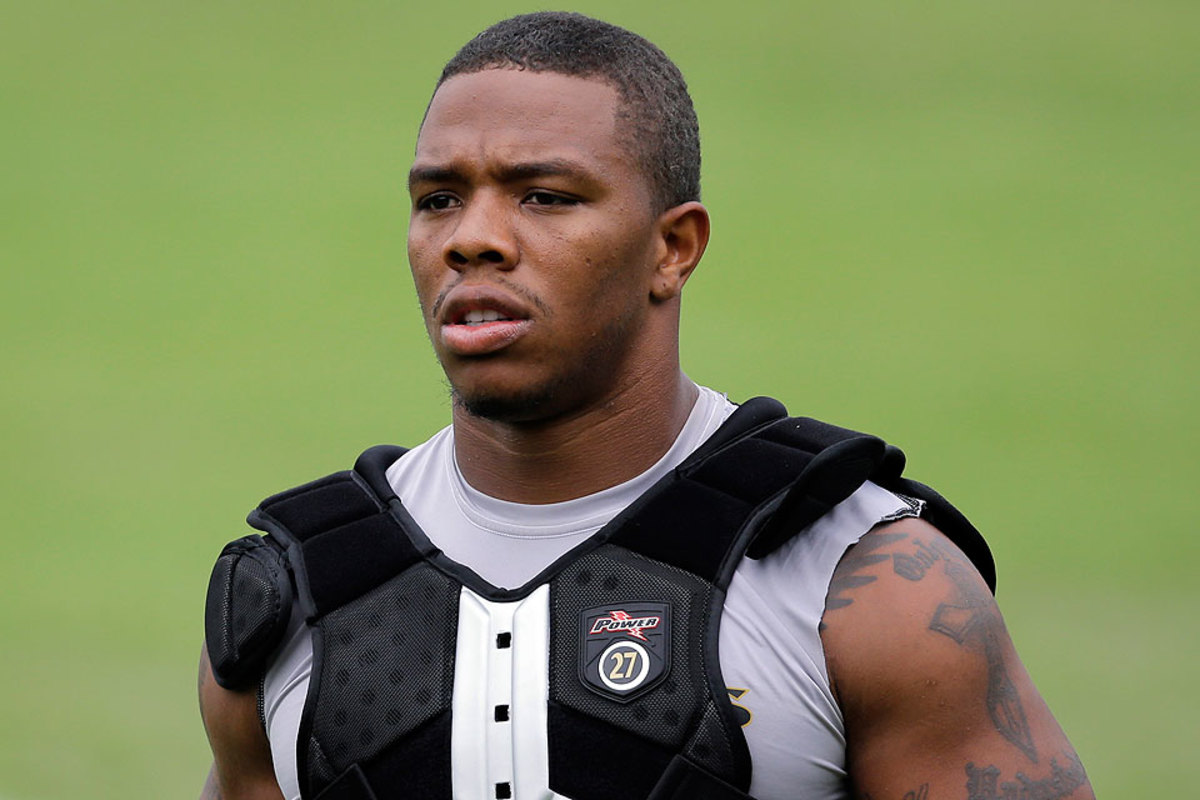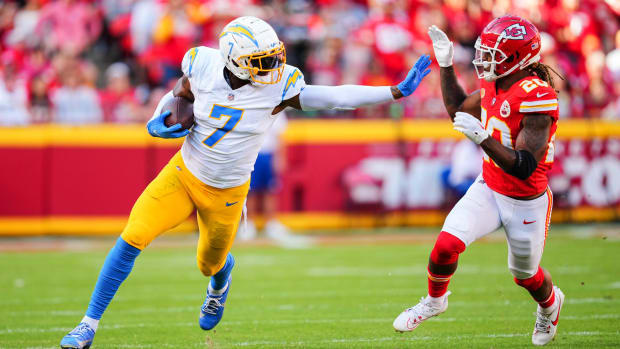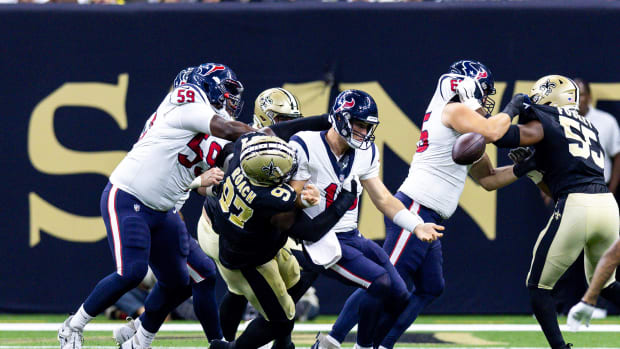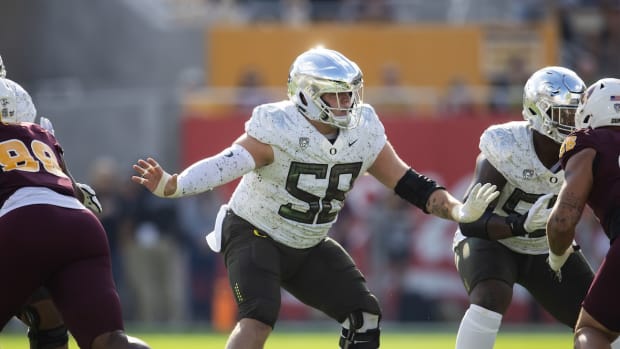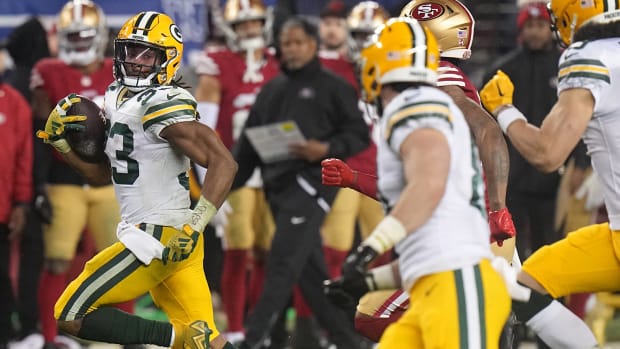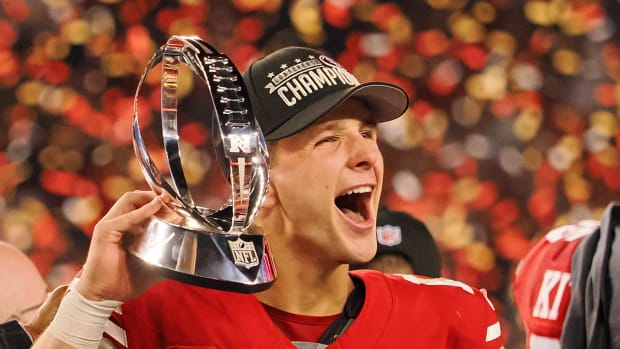An Inevitable Conversation
UPDATED: Ray Rice won his appeal and was reinstated to the NFL on Friday, Nov. 28. This story from late October breaks down how coaches and GMs will assess whether they should make a move to sign the embattled running back.
The player most mentioned in the NFL this year has not played a down on the field, but now he is getting suited up for his big game.
Ray Rice will have his day in court next week to dispute the NFL’s indefinite suspension, arguing it was a knee-jerk reaction to the same set of facts for which Rice was previously suspended for two games. Rice and his camp feel very confident that he will be exonerated and that he will soon be free to sign with any NFL team. That prospect, of course, begs the question of whether any team would actually sign him this year.
I remember working as a consultant to the Eagles when we signed Michael Vick soon after his release from a 23-month jail sentence for dog fighting. I have also talked with a couple of coaches, general managers and executives about the prospect, with mostly predictable responses: coaches would be open to it if they had a need, while general managers and executives would have reservations.
With that in mind, here is a script for my sense of how a conversation between a coach desirous of signing Rice and a general manager wary of doing so. The scene is in the general manager’s office, with the head coach entering stage right:
Coach: Hey, don’t throw me out of your office, but … I’d really like to bring Ray Rice in here.
GM: Seriously? You must not be familiar with TMZ. Geez, I’m not throwing you out, but I might drug-test you. All right, sit down, but don’t get too comfortable. I’ll hear you out.
The Ravens Without Rice
How has Baltimore held it together on the field in the aftermath of Ray Rice? Jenny Vrentas takes a look at how Joe Flacco has kept Baltimore on track—and how the team upgraded at running back. FULL STORY
Coach:
I know the kid’s been dragged through the mud after that video, but the Ravens guys supported him like hell before it. Now he had his day in court and we’re right back to where this thing started when he was getting ready to play for Baltimore. He’s the same kid he was back then.
GM: Well, back then no one had seen him punch his wife, and that was before he became the face of evil in the NFL. We weren’t getting all these memos about domestic violence and the league sending a counselor into our building. Fair or unfair, the NFL’s been trying to shake that video all year. This guy is radioactive.
Coach: I know, but you know all that stuff is just for PR and sponsors. It got blown up, and then the Adrian Peterson and Greg Hardy stuff happened and it spun out of control. Rice knows he made a big mistake and has been paying for it ever since. And the thing is this: His wife stood by him, Ozzie Newsome stood by him, John Harbaugh stood by him, the owner stood by him.
GM: They may have, but seriously, this would not be a good look for us. The minute anyone got a sniff that we would bring him in—even for a visit, let alone a signing—we would have every women’s group in the country shouting from the rooftops. We’d have picketers. We’d have boycotts. We’d have domestic violence groups calling us abusers. We’d have ESPN and NFL Network doing nonstop coverage. We’d have the news networks swooping in like they did when the Rice TMZ video came out. This would be the number one story in the country, and not in a good way. You want that?
Coach: Of course not, but you know how things work. The protests and the media would be here a few days, and then they’d be on to the next big story. Rice and his wife would talk about how they’re working on things, second chances and lessons learned, and it would all get back to normal. We would just have to get through about three days of craziness.
GM: I think it would be more than three days, and it’s not just the media; it’s corporate sponsors, season ticket holders, etc. And I haven’t even mentioned our owner. I doubt he would have any appetite for this.
Coach: I thought about him. He could use this to create some positive programs and change, the way Jeffrey Lurie did when Vick came to the Eagles. He should call Steve Bisciotti, who seemed to love the kid and said he would hire Rice back in a second, just not to play.
GM: But you want him to play! And it’s not just the owner. It’s the league. It’s Roger Goodell. They’d get the same protests we would get. They probably don’t want him back out there this year.
Coach: Hey, you know Roger and his whole redemption thing. We saw it with Vick, Ben Roethlisberger and now maybe Aldon Smith. I hear Rice is doing a lot of community service, going to couples therapy with his wife, that kind of thing. So this could be a real redemption story for him and us.
In 2009, Andy Reid and the Eagles signed Michael Vick, who used Tony Dungy to help rehab his image in the wake of his dogfighting incarceration. (Drew Hallowell/Getty Images)
GM: You’ve got responses to everything I bring up, but I have to ask you this: Why jump through all these hoops for an aging running back? Can he even still play?
Coach: I think he can, or I wouldn’t be in here. I looked at all his tape the past two years. We don’t need him to be a feature back like he was; we’ll rotate him in with the other guy. But one thing we know: He’s got fresh legs! He’s always been a tough inside runner, that’s what we need.
GM: Well, you know my feeling about running backs past a certain age; they fall off the cliff fast. Rice may have hit that point, fresh legs or not.
Coach: Ozzie and John really wanted him back; otherwise they wouldn’t have supported him the way they did when the whole thing happened. And we don’t need him for years; we just need him for a few games.
GM: You can’t find another runner out there without trunks full of baggage like this guy? Also, we have a couple young guys that we’re working with; Rice will retard their development if he’s taking the reps.
Coach: Or Rice could be a mentor to them … well, at least on the field. Listen, I’m trying to win games now, and he gives us the best chance.
GM: Yes, but I have to think about more than this year.
Coach: I don’t, if I don’t win. Have I showed you the statistics on how many coaches get fired recently?
GM: There you go again. Listen; if I did this—and that’s a big if—his agent would have to agree to something past this year, with no risk to us, in case this guy can still play at a high level. We wouldn’t go through all this for a short-term rental.
Coach: I’m good with that.
GM: I’m still against it, but I will do this: I’ll look at his tape from last year and talk to our scouts and our marketing people. If they're interested, I would then take it to the owner, who would then talk to Roger. Just to be clear, though: You sure you want to throw your chips in on this guy?
Coach: Yes. All I know is he’ll help us win now.
GM: Spoken like a true coach. I’ll look into it.
My Midseason Thoughts
Imposing his will
Two years later, it is still hard to believe that Peyton Manning—even after multiple neck surgeries—was acquired “off the street” as a free agent cut by the Colts. He is, amazingly, an ascending player at age 38, imposing his will in recent games. The Broncos enhanced their team for the short term, with aggressive offseason plays (yet very limited guarantees past this year)—in DeMarcus Ware, Aqib Talib, T.J. Ward and Emmanuel Sanders—and now appear poised for a Super Bowl run.
Never the Same
As happens often with Super Bowl winners in the euphoria of the moment, the Seahawks were destined for multiple championships back in February. The reality in team sports, however, is that nothing is ever static; the dynamic changes every year, even with the same people, and success has a way of hiding internal warts. The Seahawks are certainly a solid team, but now we’ll see what’s really behind the curtain with them.
Flying low
When watching the Falcons on Hard Knocks this summer, I hoped to see—after a dreadful season last year—some evidence of innovation, something beyond the tired clichés of coaches bullying players with red-faced screaming and expletive-laced put-downs. There was none of that. I wondered whether if another season started going downhill—as it now has—there would be any fresh answers. From that view, it did not appear to a group willing to change.
Midseason Report: 2014
The MMQB breaks down the first-half winners and losers, picks award winners and predicts what will happen down the stretch. FULL REPORT
So talented, so frustrating
I remember when our scouts came back from Vanderbilt’s Pro Day one year with mouths agape raving over Jay Cutler’s arm as he whizzed passes through a strong wind on a raw day. Cutler continues to be that player: one who wows scouts with his arm strength but confounds coaches and fans with his decision-making.
I had expected the Bears to go year-to-year with Cutler on the franchise tag this year as they continued to evaluate. Now, with a new deal worth $54 million guaranteed, he is their quarterback through 2016 at least, for better or worse.
Non-trading deadline
Unlike the trade deadline of Major League Baseball, the NBA or the NHL, the NFL trading deadline is a snooze fest (this year was no exception, with only a couple of Buccaneers being “called up” to the Patriots). There are discussions, but most involve teams trying to unload bad players, bad people or bad contracts on other teams. Further, football is schematic: It is hard to seamlessly insert players into schemes midseason.
I remember lobbying the league for a later trade deadline, perhaps in late November, but the NFL did not want the baseball model of renting players for the stretch run. By not wanting that, however, they lose whatever buzz a trade deadline offers.
Character counts
Every player has a talent/character equation, and every team has a different tolerance level for players with questionable off-field behavior, work ethic, selfishness, etc. No team can claim a locker room full of choirboys, but some tolerate more “maintenance guys” than others.
In the current climate, however, there is a sense that teams are lowering tolerance for problem players, even those with special talent. Two of the most dynamic players in the NFL—DeSean Jackson and Percy Harvin—were released and traded for marginal return, respectively. The tide appears to be turning in the talent/character evaluation game; we will see if it lasts.
[widget widget_name="SI Newsletter Widget”]
































